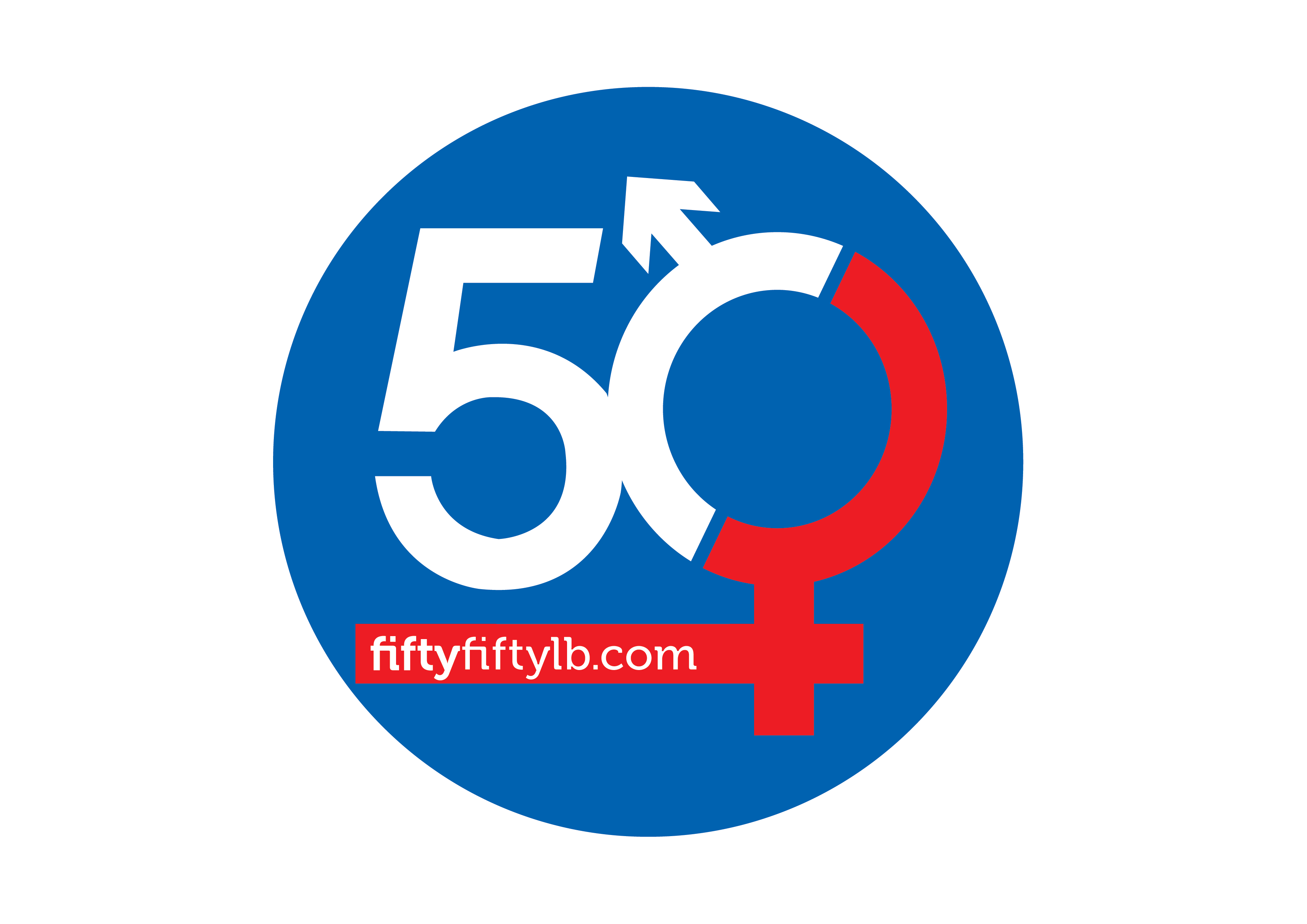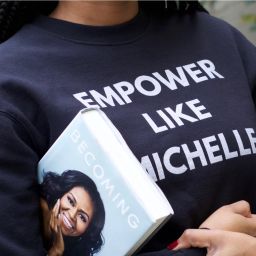Every social entrepreneur has a personal story—an experience, an orientation, or a philosophy that drives ambition. In the case of Joelle Aboufarhat, co-founder and CEO of Fiftyfifty, the path to entrepreneurship began at home. She grew up in a Lebanese family of five girls. Her proud parents taught the girls that they could do anything they wanted in life. There were no restrictions, no high hurdles, no expectation that they should do any differently than their male friends. All the girls grew to be successful professional women.
Joelle started her career in journalism. Then, after six to seven years, she moved into communications, advertising, and branding. She started her own firm and focused on corporate and personal branding for business and politics. Like her sisters, Joelle was successful in her work. However, like so many other women, Joelle’s path was more challenging than it should have been.
Since her first days of work out of college, she faced harassment and discrimination. In one situation, the abuse was so bad that she decided to switch jobs. At the time, she accepted the situation. She said to herself somewhat fatalistically, “Okay, fine. If this is how it has to be.” But she also knew it did not have to be this way and started to search for different solutions.
Joelle began to investigate the legal route as one possible solution. What were the laws that supported women and protected women’s rights? She found that there were in fact laws on the books but that they were antiquated and unhelpful.
Although Lebanon had granted women the right to vote and hold office in 1953, women were vastly underrepresented in elected positions nearly 60 years later. In 2012, there were only four women parliamentarians among the 128 seats. None of the political parties had prioritized women’s representation in decision-making roles, and men were not supporting legal reforms to promote gender equity or equal opportunities.
The Lebanese legal system, for example, left personal laws to individual religious sects, of which there are 18 recognized sects in the country. That means 18 different laws related to issues such as marriage, divorce, and inheritance. These include the most sensitive issues, such as child custody and age of marriage. In most situations, these laws substantially favored men. Even laws meant to protect women from harassment and discrimination were not being enforced.
Joelle and two friends said ENOUGH. They launched the nonprofit “Women in Front” in 2012 to help promote women candidates for the 2013 parliamentary elections. They saw this as a short-term endeavor to increase the proportion of women in elected positions as promoted by the Beijing Declaration, international Convention on the Elimination of All Forms of Discrimination Against Women, and Lebanese law. Their goal was at least 40 seats for women, or approximately 30 percent of parliament, as well as 30 to 50 percent of seats on municipal councils. They envisioned that Women in Front would only be necessary for two to three years, after which legislative equity would be achieved. Now, 12 years later, they recognize that there is still much to do.
Registering Women in Front in 2012 was not easy. Joelle and her co-founders had to complete an extensive application, including an explanation of the organization’s goals and plans. One early challenge was the organization’s name. Originally, they tried to register under the name Women Lobby, but the Ministry of Interior and Municipality rejected that name, as it sounded too politically charged. Ultimately, the Ministry accepted the name Women in Front.
Although the registration process was slow, Women in Front took immediate action after submitting its application. With the 2013 elections looming, they had much work to do. Initially self-funded, their first action was to organize 64 women leaders (have the number of parliamentary seats) to serve as a sounding board and think tank regarding women’s political empowerment. They then worked with another organization that had already received their registration to create and distribute a booklet to promote 100 women running for office. They also started to write grant proposals. Women in Front’s registration was approved three to four months later.
Unfortunately, the 2013 elections were postponed three times and didn’t take place until 2018. However, this delay allowed Women in Front to grow its work and influence. In the beginning, the NGO started small. The founders worked part-time while they maintained their businesses. They honed their grant-writing skills with support from professional workshops and many applications and started to receive funding from international donors. Over time, participation increased until Joelle herself was spending 90 percent of her time on Women in Front.
The year of that next parliamentary election, 2018, was pivotal for Women in Front. The organization had grown to the point that it faced an important philosophical question: Was the organization’s mission to promote women or gender equality? It chose the latter. The founders and staff recognized that men could also advocate for women and invited them into the movement. They also changed their name to reflect the shifting work. Women in Front became Fiftyfifty.
Between the parliamentary elections in 2018 and 2022, Fiftyfifty achieved important successes. Their network of women advocates included numerous members of various political parties. Coached by Fiftyfifty, these women were able to convince their parties to support quotas for women’s leadership in the parties and elected office. This support was completely new!
Fiftyfifty helped win the support of five of the seven major parties to support the 30 percent quota for women in parliament and 30-50 percent in municipal elections. One party, the Progressive Socialist Party, has already achieved the 30 percent goal for women’s participation in its political leadership. Its political bureau is also now 50/50, including four men and four women. Another party, the Kataeb Party, has now increased its quota for women from 20 to 25 percent. Fiftyfifty helped inspire 122 women to run for parliament in 2022. This is up from 12 in 2018. The result was eight elected female parliamentarians, up from four in 2018. This was lower than the advocates had hoped, but the trends were moving in a positive direction. Step by step!
There is still much work to be done. Fiftyfifty is making huge strides for political representation to be more equitable in Lebanon. This is the first step in the larger, longer-term goal of equal legal representation for women and men. Now with 11 staff (eight full-time and three part-time) and more than a decade of experience, Joelle is optimistic that Lebanon will see even greater gains in the 2026 parliamentary election cycle. As a hint of what is to come, there are already 157 women candidates running for these seats, a 13-fold increase from just six years ago.
Joelle’s advice for future social entrepreneurs is to focus their work and be fearless and unwavering in pursuing their goals. Specializing in the promotion of female candidates, for example, created Women in Front’s initial brand. It was the “go to” organization and helped secure a strong reputation in Lebanon early in the organization’s development. In addition, throughout its history, Fiftyfifty has never strayed from its core mission. Despite opportunities to expand into new content areas, the founders and staff have maintained their core work. At various times, when resources were lean, it was tempting to grow into new spaces, but doing so would have drained the underlying passion that continues to drive its overall work.
Joelle also said that she regularly receives advice about how to run Fiftyfifty and what the organization should do to be more successful. This includes regular feedback from donors. Recommendations can be about any issue, either large and small. Of course, she listens when the advice makes sense. But she never feels pressured to implement an idea that is counter to Fiftyfifty’s mission. She feels comfortable politely saying “no” and feels that donors, advocates, and well-wishers appreciate this tenacity and perhaps even support Fiftyfifty more for it.







[…] Read More Share0 © 2019 Fifty-Fifty Lebanon, All rights reserved |Powered By Dana Digital Media […]
[…] للمزيد من القراءة Share0 © 2019 Fifty-Fifty Lebanon, All rights reserved |Powered By Dana Digital Media […]